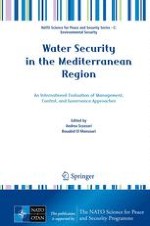Abstract
This paper examines the concept of environmental security and the relevance of governance frameworks (policies, laws, and institutions) for mitigating water scarcity and degradation concerns in the Middle East and North African (MENA) region (This region consists of Algeria, Bahrain, Djibouti, Egypt, Iran, Iraq, Israel, Jordan, Kuwait, Lebanon, Libya, Malta, Morocco, Oman, Qatar, Saudi Arabia, Syria, Tunisia, the United Arab Emirates, West Bank and Gaza, and Yemen). The paper highlights the importance of governance frameworks that support meaningful risk assessment, policy analysis, strategic planning, and policy implementation in coordination with experts in the scientific community and other relevant stakeholders. The paper begins by providing a core definition of environmental security, which is affected by anthropogenic drivers categorized as resource demand, resource depletion, and resource degradation. It also offers a dynamic model for assessing security-relevant consequences that arise through the interaction of these drivers with natural events or conditions and population/technology concerns (collectively “environmental stressors”) within a local, national and regional economic, social, and political context. Under this model, anthropogenic triggers act directly or in combination with natural conditions or events to threaten security through a range of vectors. These consequences may escalate or interact – driven by social, political or economic factors – often in a nonlinear fashion. The author posits that governance frameworks may intervene within the broader economic, political and social context to minimize the cause, avoid the consequence, or prevent escalation. The magnitude and impact of any specific security threat depends on the ability of governance frameworks to avoid and/or respond. Those states with adequate governance frameworks are more likely to recognize environmental stresses and minimize their impact. Environmental security challenges will ultimately be met by states on the basis of their national priorities and traditions, but the author suggests that careful coordination by state officials with key civil society stakeholders and relevant members of the scientific community is needed to animate agencies that have not been traditional partners and to strengthen the legitimacy and efficacy of institutional responses.
